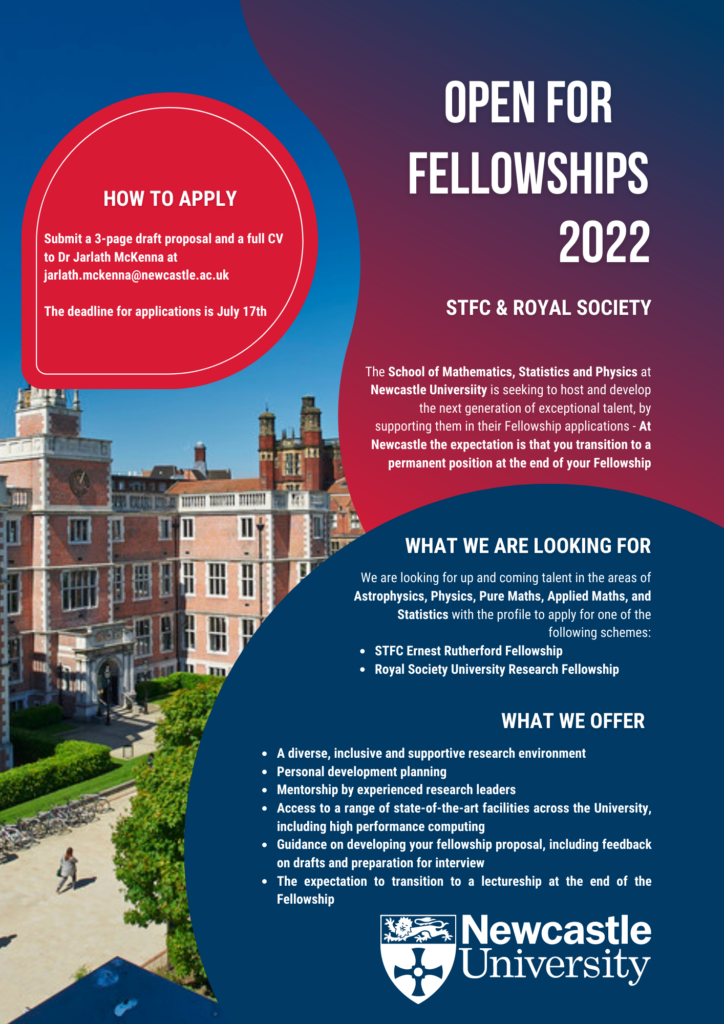Last week, several members of the Astro-Obs group travelled to the Royal Observatory in Edinburgh for the annual Durham-Edinburgh eXtragalactic workshop. The workshop, which has a strong focus on research into active galactic nuclei and observational cosmology, began as an annual meeting between academics at Durham and Edinburgh. It has since grown to include, Newcastle University, Lancaster University, and the University of St. Andrews.
The workshop provides a great opportunity for early career researchers to present their work, and this year Newcastle had their strongest showing yet, with 10 members of Astro-Obs attending, 4 of whom presented. First year PhD student Houda Haidar gave a 15 minute talk on the black hole population in low-mass galaxies in large scale cosmological simulations (her paper can be found here) and Charlie MacMahon, another first year PhD student, gave a short 3 minute flash talk on a novel method for probing the intrinsic alignment of galaxies.
Astro-Obs members brave the wind for a photo overlooking Edinburgh from the top of the Royal Observatory
Postdoc Vicky Fawcett, who joined us this year following the completion of her PhD at Durham (her thesis can be found here), gave a talk on extremely red quasars in DESI. Vicky also helped in the organisation of the whole event.
Finally, as the penultimate talk of the two day workshop, third year PhD student Alex Gough spoke about their recent paper on dark matter multi-streaming (see here for more details). Many other PhD students also attended, further showcasing the development of Astro-Obs and Newcastle as a place for the study of extragalactic physics. Danielle Leonard also played an important role, chairing one of the sessions to ensure everything ran smoothly and to time!
NUdata PhD positions available for September 2023
Applications are now open for up to 9 fully funded PhD studentships, as part of the NUdata centre for doctoral training. The NUdata CDT is a partnership between Newcastle University and Northumbria University. Successful applicants would be able to undertake an original research project in one of the Astro-Obs group’s research fields (or another, see link for more detail). In addition to this, they would also be trained in data science techniques, and have the opportunity of a placement either in industry, charity, or government.
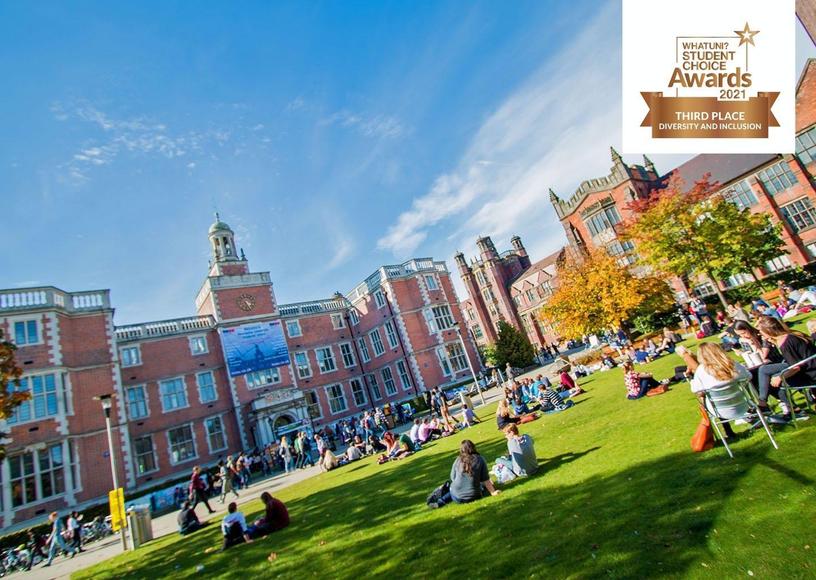
23 projects are available for the 25th September 2023 start date. Applications close on the 31st January 2023. There will also be a full day on-campus event on the 9th January 2023 for applicants to see the city, universities, and meet potential supervisors. More details can be found below.
North East STEM Awards
On November 11th, the North East STEM Awards were held in Newcastle. This event celebrates and recognises North East STEM Ambassadors and STEM organisations who, through their interaction, have inspired, engaged and enthused many young people and their teachers in STEM over the past year. Award categories included most inspirational employer, highest number of hours recorded by a STEM Ambassador, and special recognition awards.
Dr Vicky Fawcett attended the award ceremony and won a special recognition award for outstanding contribution to STEM education in the North East. She received this award based on her outreach work within the STEM Ambassador program1. This included presenting at STEMFest in Space 2020, 20212, running various astronomy school seminars, winning the ‘I’m a Scientist, get me out of here!’ outreach event3, and organising a space activity day at the Great North Museum: Hancock during World Space Week.
To read more, see: https://northeaststemhub.co.uk/news-article/north-east-stem-awards-2022
[2] https://stemfest.org.uk/this-years-speakers/
[3] https://helium22.imascientist.org.uk/2022/04/21/a-thank-you-from-your-winner-victoria
Special Sonification Edition in Nature Astronomy and Panellist for UN webinar
November 2022: This month Nature Astronomy published a special issue of their journal, featuring four articles on sonification of astronomical data, co-ordinated by the Audio Universe team, led by Dr. Chris Harrison. Furthermore, Chris Harrison will be one of five expert panellists in a webinar on sonification in space sciences run by the United Nations Office for Outer Space Affairs (UNOOSA).
The Nature Astronomy special issue is introduced by the editor with a commentary entitled “Hearing is Believing“. The special issue is a result of the Audible Workshop, that was organised and chaired by the Audio Universe team (including Chris Harrison, Anita Zanella and Nic Bonne), that took place in the Lorentz Centre (Leiden) last year. This workshop brought together 50 researchers from a variety of backgrounds including astronomy, sound perception, sound design and education. The workshop discussed the current status of astronomy sonification projects as well as the current challenges facing progress in this area and ideas for future plans. Nature Astronomy took this opportunity to allow sonification to be included as a figure for the first time. Hopefully opening up the door for many more published sonifications in this journal and others. Some of the outcomes of the workshop are summarised in the articles below:
(1) A meeting report led by Chris Harrison. Link to main article: https://www.nature.com/articles/s41550-021-01582-y. Link to a preprint version on arxiv: https://arxiv.org/abs/2206.13542
(2) A review of almost 100 sonification projects in astronomy, led by Anita Zanella and Chris Harrison. Link to main article: https://www.nature.com/articles/s41550-022-01721-z. Link to a preprint version on arxiv: https://arxiv.org/abs/2206.13536
Partly due to this work, and due to the wider Audio Universe project, UNOOSA contacted Chris Harrison to act as a consultant on a policy recommendation document they are working on the topic of sonification and accessibility in space sciences. As part of this UNSOOA Space for Persons with Disabilities project they are running a public webinar on the 17th of November, and Chris is one of the five expert panellists taking part.
Inspiring the next generation: Astro-Obs members organise space day outreach event
To celebrate World Space Week 2022 the astronomy group at Newcastle University ran a “space day” at the Great North Museum: Hancock [1,2]. During the day we had a number of engaging multi-sensory astronomy related activities.
Throughout the day there were 10 minute flash talks, presented by Vicky Fawcett (PDRA), Danny Dixon (PhD), and Dr David Rosario (Senior Lecturer). The flash talks explored the topics: ‘Alien Worlds’, ‘Do Galaxies Dance?’, and ‘Space Junk: Taking out the Trash’, the latter of which is linked to the theme of this year’s World Space Week: Space Sustainability.
Other activities included a James Webb Space Telescope (JWST) demonstration. This was delivered predominantly by Dr David Rosario, who is leading one of the first science projects with JWST. Visitors could use iPads connected to IR cameras to explore how JWST sees the Universe. Various demonstrations included one person hiding behind a bin bag, which is opaque to our eyes. However, when the IR camera is used, we can see straight through. This is similar to how JWST views galaxies – we can now “see” behind obscuring dust, finding details that we could not see previously (e.g., with the Hubble Space Telescope). An additional demonstration is shown below; using IR to compare temperatures.
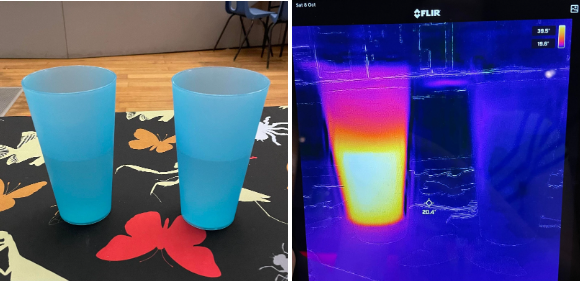
We also ran a craft activity in which you could make your own planet surface (see images below). Visitors could choose whether to create the surface of Earth, Mars, Mercury, Venus, or to imagine a completely new planet.
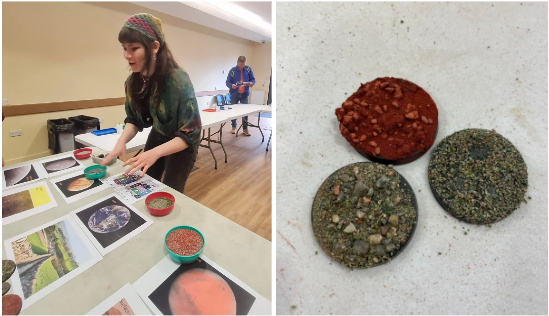
One of the highlights of the activities was our astronomy sonification, where visitors could use the motion of their hands to explore astronomical images using sound (example shown below). This activity used code by Michele Ginolfi (for more details, see [3]) and was also inspired by Audio Universe, an outreach project led by Dr Chris Harrison, that aims to make Astronomy more accessible to vision impaired children (for more details, see [4]). Throughout the day visitors could also watch the ‘Audio Universe: Tour of the Solar System’ planetarium show, which explores the solar system with sound (developed by Dr Chris Harrison, see [5]).
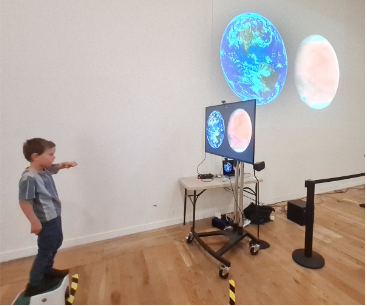
Another multi-sensory activity we ran was a tactile treasure hunt, inspired by Tactile Universe, an outreach project led by Dr Nicolas Bonne at the University of Portsmouth, which is another project that aims to make Astronomy more accessible (for more details, see [6]). Visitors followed clues spread around the museum to find 3D printed tactile models and educational facts for a variety of astronomical objects.
Overall the museum had ~650 visitors on the day and we received very positive feedback. We will continue to work with the Great North Museum on future outreach projects with the aim to inspire more school pupils based in North East England to pursue a STEM career.
None of this would have been possible without the Great North Museum staff, astronomy staff, outreach team, and PhD students who helped organise and run the event; in particular, Dr Chris Harrison and Dr Vicky Fawcett.
References:
[1] https://greatnorthmuseum.org.uk/
[2] https://www.worldspaceweek.org/
[3] https://ikeloablog.com/2022/03/27/diamo-un-po-di-suono-alle-immagini/
[4] https://www.audiouniverse.org/home
[5] https://www.ncl.ac.uk/press/articles/latest/2021/11/audiouniversetourofthesolarsystem/[6] https://tactileuniverse.org/
Audio Universe named winner of the Early Career Academic Award at the Newcastle University Engagement and Place Awards 2022
Earlier this year, Dr. Chris Harrison and Audio Universe were presented the Early Career Academic Award at the Newcastle University Engagement and Place Awards, a showcase celebrating innovative collaborations between the University and the public that demonstrate research excellence and work for the public good. The Early Career Academic Award recognises these qualities in engagement projects led by an early career academic from across all of the university faculties. At the time of consideration, the planetarium show had been downloaded by 31 planetariums internationally and has received over 1,300 combined views in English, Spanish and Italian.
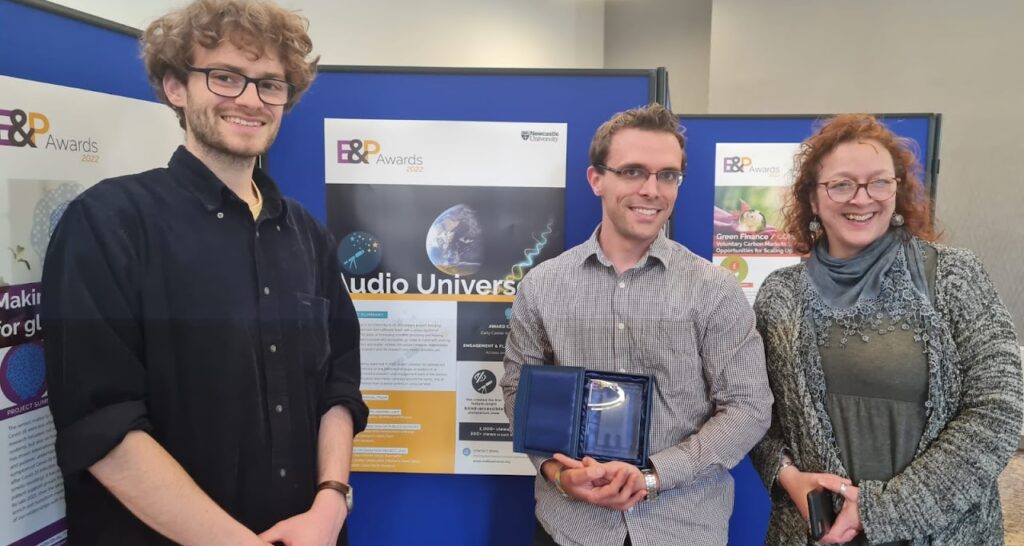
For more information on the Audio Universe project, which seeks to make astronomy more accessible for the visually impaired and enable us to interpret astronomical measurements using senses other than sight, can be found at www.audiouniverse.org.
Astro-Obs Members attend specialised AGN conference in Reykjavik
Several members of the Astro-Obs group at Newcastle University flew to Iceland to attend the conference ‘What Drives the Growth of Black Holes? A Decade of Reflection’ at the end of September. This week-long specialist conference was held in the beautiful Harpa Centre in Reykjavik. Researchers there aimed to address fundamental questions around active galactic nuclei (AGN) and their black holes, such as:
- How does gas accrete onto black holes from the kpc to sub-pc scales?
- How do the properties of host galaxies and the larger scale environment affect black hole growth?
- What fuels the rapid growth of the oldest and most massive black holes?
- What impact do AGN winds, outflows, and jets have on fuelling the black hole and star formation in the galaxy?
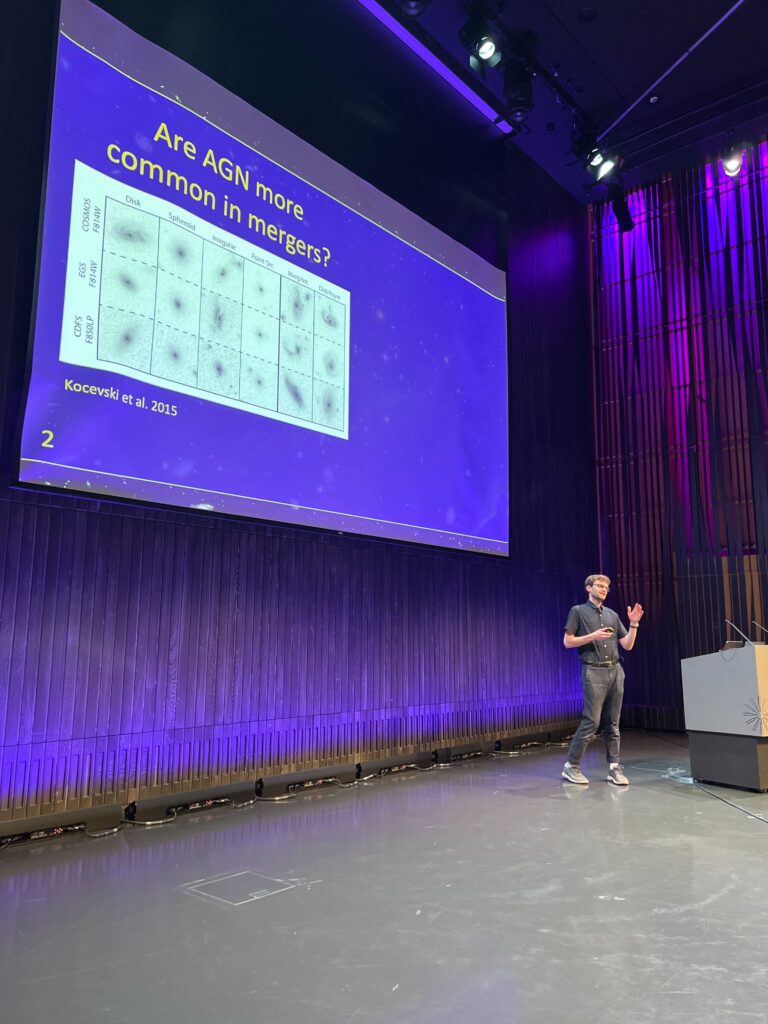
During the week, our group members not only attended, but played a key role in the events taking place. Second year PhD student Sean Dougherty gave a talk on his work in finding enhanced AGN activity in high-redshift galaxy mergers. Final-year PhD student Aishwarya Girdhar presented her work on the impact of multi-phase outflows and low power radio jets on the host galaxies of quasars.
Our new postdoctoral researcher, Dr Vicky Fawcett, spoke on the fundamental differences between red and blue quasars. Dr Tiago Costa, who will be joining us as a NUAcT fellow in August, also gave an excellent overview talk.
Finally, Dr Chris Harrison rounded out the week by leading a discussion on the progress made in understanding AGN feedback over the past decade.
Previously, the event had been cancelled due to the eruption of the Eyjafjallajökull volcano in 2010 and then when the next decade came round in 2020, the covid pandemic once again prevented these researchers from meeting. But finally in 2022 it was worth the wait, and the Newcastle Astro-Obs group were able to attend with an even bigger contingent than would have been present in 2020!
Paper: Making (dark matter) waves – how wave interference can help model cold dark matter
Alex’s first first-author paper is now available on arXiv! An art piece Alex made related to this work also placed 2nd in the Art of Science competition hosted by the SAgE faculty at Newcastle. You can see more images and descriptions in Alex’s twitter thread on the paper (and the associated art piece).
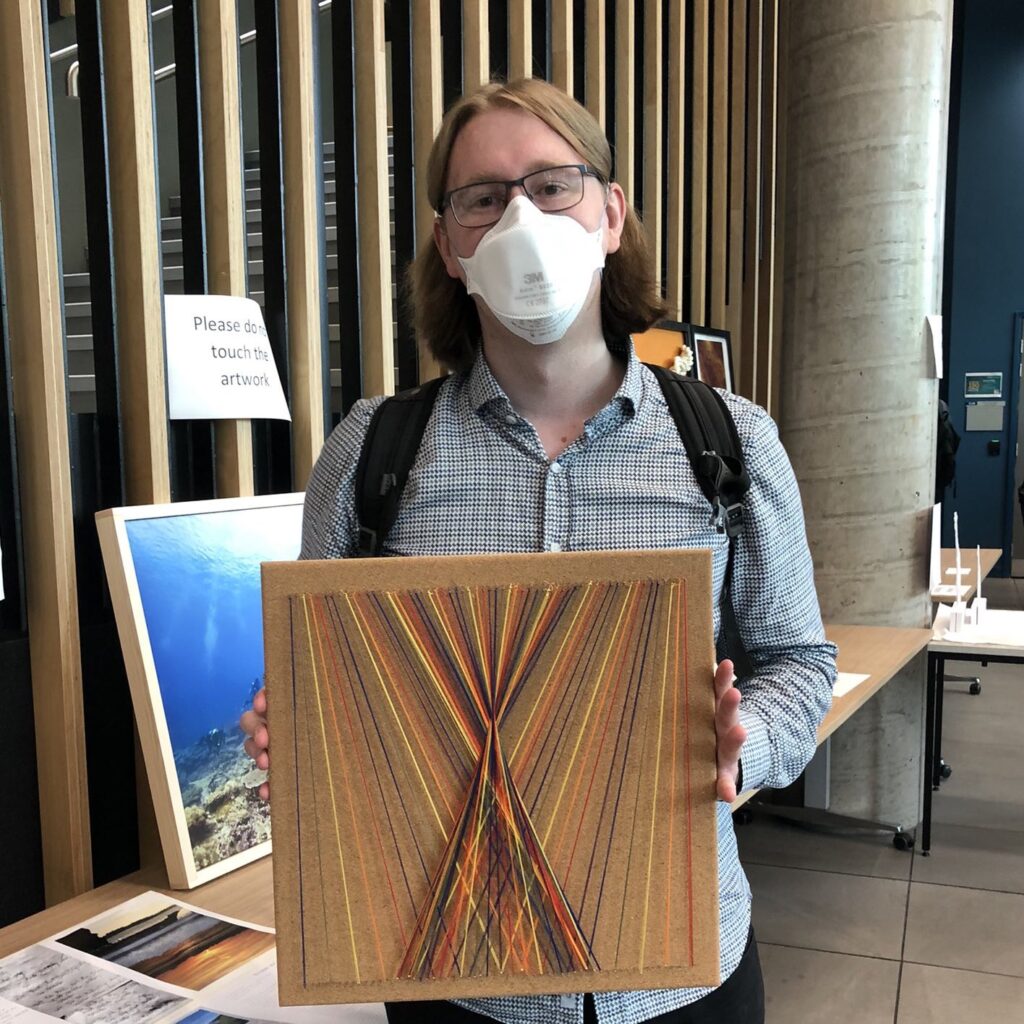
This paper models the dark matter field as a single wavefunction, rather than traditional fluid variables or collisionless particles. We show explicitly how the complex phenomenology of multi-streaming (caused by collisionless particles flowing through each other) is encoded in the interference and oscillations of the wavefunction in a simple toy model. This wave model avoids the infinite density spikes which occur when evolving classical cold dark matter collapse.
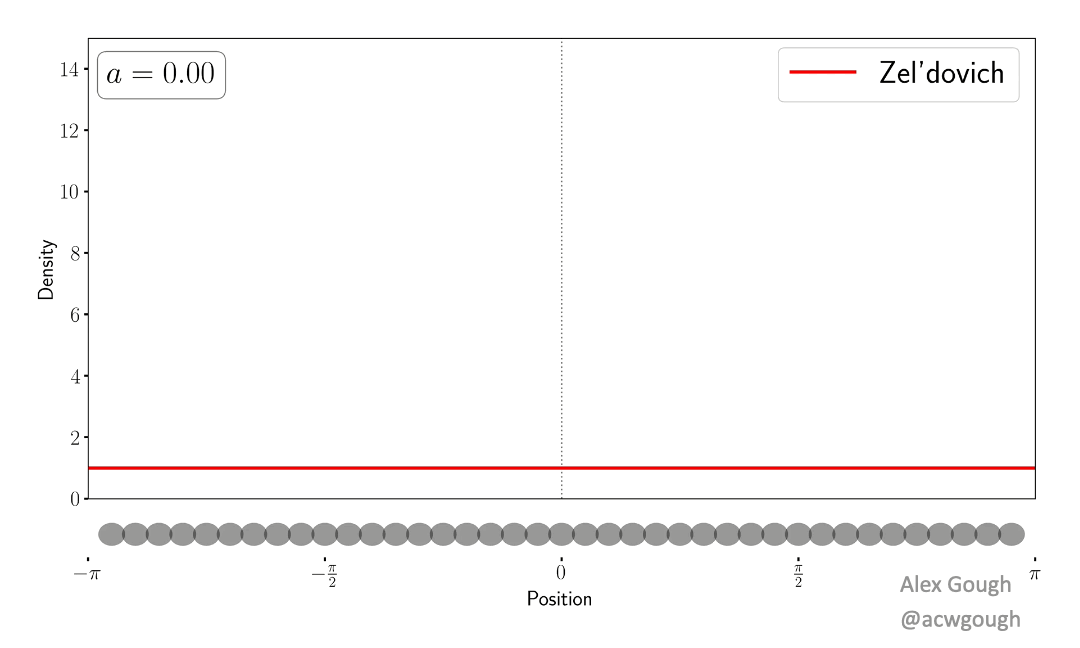
This paper demonstrates how the oscillations in the wavefunction can be “unwoven” to recover a set of wavefunctions corresponding to the set of classical streams in the Zel’dovich approximation. In the multi-stream region, where the dark matter cannot be described by a perfect fluid, we demonstrate how to separate the wavefunction into an “average part”, which describes the classical fluid behaviour, and an oscillatory “hidden part” which is responsible for producing beyond perfect fluid quantities such as velocity dispersion.
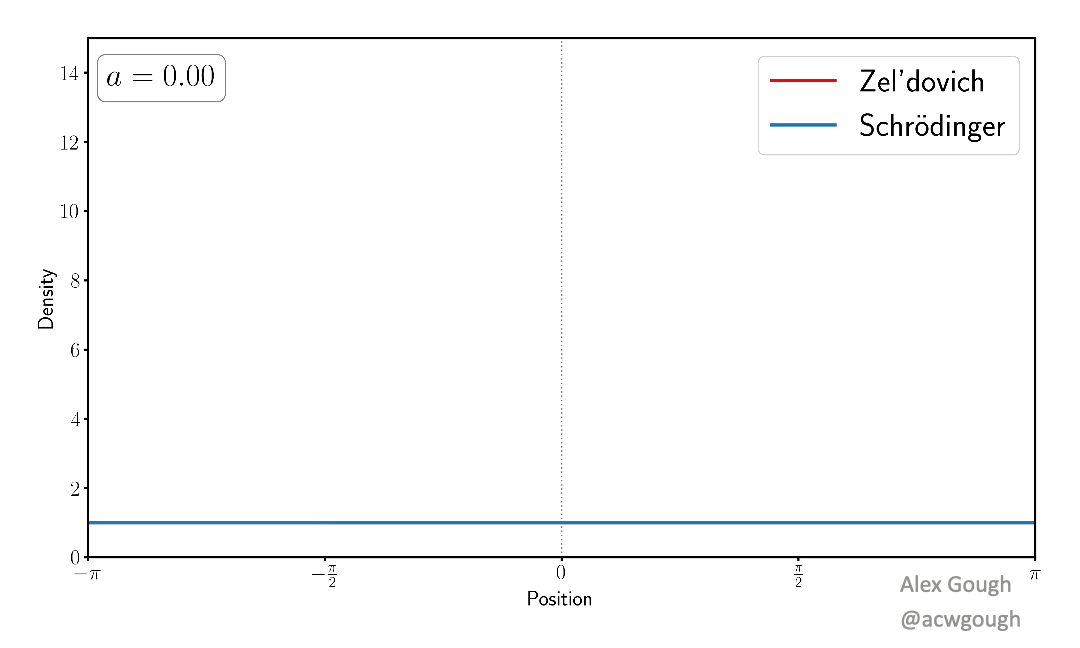
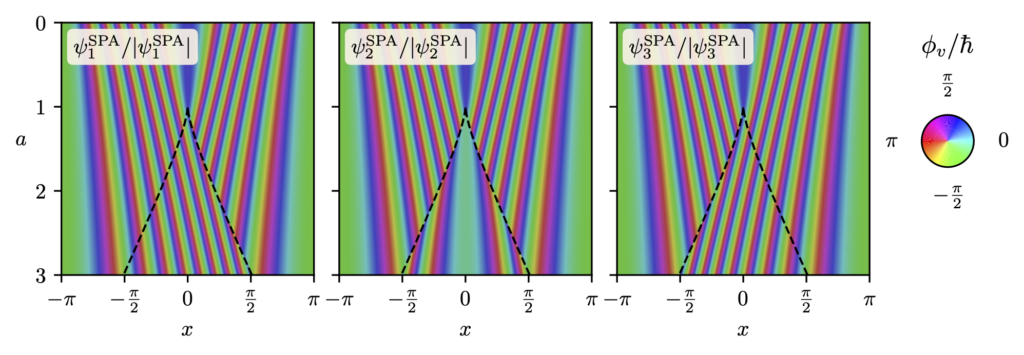
The dense caustics formed by cold dark matter are replaced with diffraction caustics in the simple wave model, which provide classification of these caustics, and certain universal features related to the wave nature of the model. Such features are akin to those found in truly wavelike models of dark matter, such as fuzzy dark matter and ultralight axions.
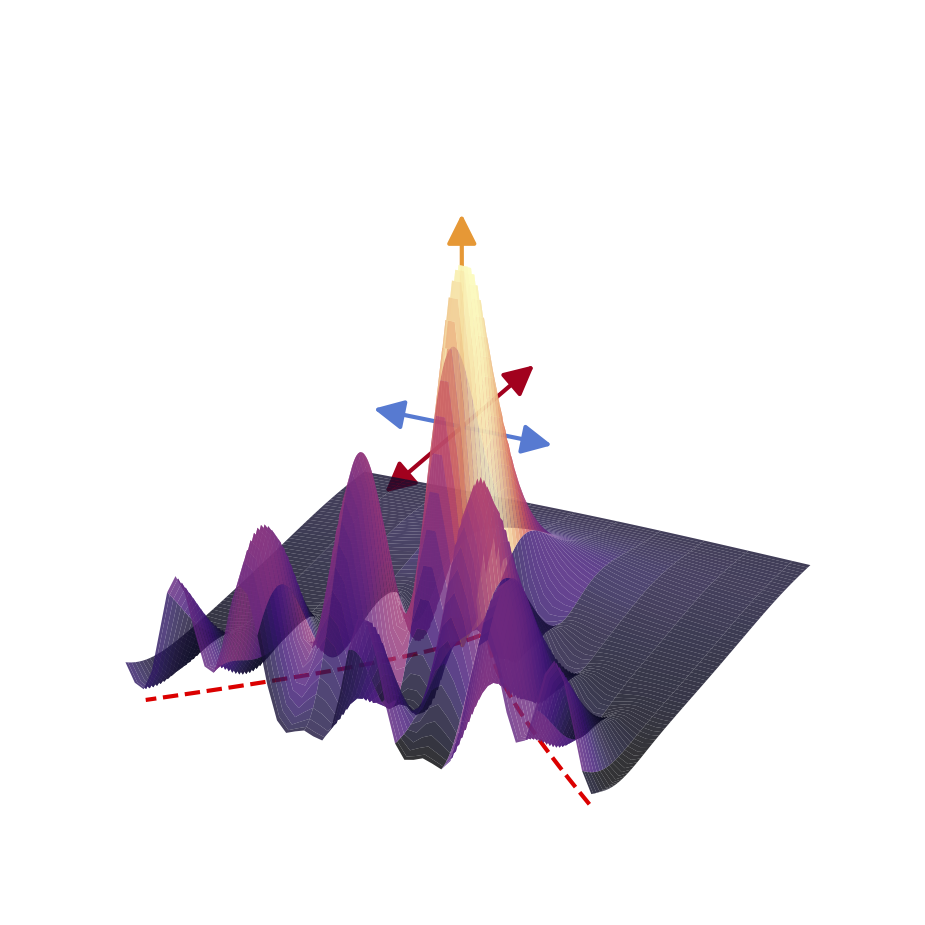
Lecturer/Senior Lecture Position in Astrophysics
As part of a strategy to rapidly expand our Physics programme, the School of Mathematics, Statistics and Physics (MSP) is looking to appoint an Astrophysicist. The post is required to commence September 2023 at the latest. Deadline 20th September 2022.
Application information and form: https://jobs.ncl.ac.uk/job/Newcastle-LecturerSenior-Lecturer-in-Astrophysics/819865601/
We are looking for an enthusiastic academic with expertise in any area of observational or theoretical astrophysics. You will be expected to establish their own area of expertise but may find synergies with our existing areas of strength (galactic magnetism, stellar and planetary (magneto-) hydrodynamics, AGN and accretion physics, neutron stars, cosmology and relativity). Applications are particularly encouraged from those with an interest in Astrostatistics. Newcastle has recently secured an STFC CDT [Science and Technology Facilities Council – Centre for Doctoral Training] in data intensive science in partnership with Northumbria University.
Expressions of interest open for STFC and Royal Society Fellowships
Newcastle University is currently accepting expressions of interest to be supported for the STFC Rutherford Fellowship and the Royal Society University Research Fellowship. Please consider applying by the deadline of July 17! At Newcastle, the expectation is that you would transition to an open-ended Lectureship position at the conclusion of these fellowships.
